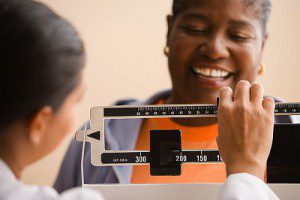Click here to download the DPP Group Lifestyle Balance™ materials
 The DPP Group Lifestyle Balance™ (GLB) Program is a comprehensive lifestyle behavior change program adapted directly from the successful lifestyle intervention used in the National Institutes of Health funded Diabetes Prevention Program (DPP). The original individually administered DPP Lifestyle Balance intervention (copyright 1996; 2011) was developed and written at the University of Pittsburgh by the DPP Lifestyle Resource Core on behalf of the DPP Research Group. With congressional funding (administered by the Air Force Medical Service) members from the original DPP lifestyle team collaborated to adapt and update the individual intervention to a group–based program with a recommended delivery schedule of 22 sessions during a 1-year period of time. The instructional content of the DPP 16-session curriculum was fully consolidated into 12-sessions designed to be administered weekly. Other modifications to core content included a broad behavioral focus on the principles for making healthy food choices and meal planning, instructions to combine both calorie and fat self-awareness and monitoring from the beginning of the intervention, and inclusion of the pedometer as a valuable tool to help increase self-awareness and motivation for increasing overall movement and physical activity levels. Individuals who take part in the program are asked to self–monitor weight, food intake and physical activity levels and are given feedback regarding their progress. Participants generally receive a variety of materials including Group Lifestyle Balance™ session handouts, a Fat and Calorie Counter, self–monitoring books for keeping track of food, physical activity and weight, a pedometer with instructions and logs, and a chart for self–monitoring (or graphing) weekly weights over the course of the program. The DPP Group Lifestyle Balance™ program is an approved curriculum for application to the Centers for Disease Control and Prevention Diabetes Prevention Recognition Program.
The DPP Group Lifestyle Balance™ (GLB) Program is a comprehensive lifestyle behavior change program adapted directly from the successful lifestyle intervention used in the National Institutes of Health funded Diabetes Prevention Program (DPP). The original individually administered DPP Lifestyle Balance intervention (copyright 1996; 2011) was developed and written at the University of Pittsburgh by the DPP Lifestyle Resource Core on behalf of the DPP Research Group. With congressional funding (administered by the Air Force Medical Service) members from the original DPP lifestyle team collaborated to adapt and update the individual intervention to a group–based program with a recommended delivery schedule of 22 sessions during a 1-year period of time. The instructional content of the DPP 16-session curriculum was fully consolidated into 12-sessions designed to be administered weekly. Other modifications to core content included a broad behavioral focus on the principles for making healthy food choices and meal planning, instructions to combine both calorie and fat self-awareness and monitoring from the beginning of the intervention, and inclusion of the pedometer as a valuable tool to help increase self-awareness and motivation for increasing overall movement and physical activity levels. Individuals who take part in the program are asked to self–monitor weight, food intake and physical activity levels and are given feedback regarding their progress. Participants generally receive a variety of materials including Group Lifestyle Balance™ session handouts, a Fat and Calorie Counter, self–monitoring books for keeping track of food, physical activity and weight, a pedometer with instructions and logs, and a chart for self–monitoring (or graphing) weekly weights over the course of the program. The DPP Group Lifestyle Balance™ program is an approved curriculum for application to the Centers for Disease Control and Prevention Diabetes Prevention Recognition Program.
DPP GLB Program Description and Delivery Schedule
 As in the DPP, the goals of the DPP GLB program are to achieve and maintain a 7% weight loss, and to safely and progressively increase to 150 minutes per week of moderately intense physical activity similar to a brisk walk. Subsequent to the 12 weekly sessions, a series of 4 transition sessions have been provided with a recommendation that the frequency of weekly group meetings be faded from weekly, to bi-weekly, and finally to monthly group contacts. This can be done with some scheduling flexibility during months 4-6 of the program. Group members are encouraged to practice their behavior change skills more independently as the level of group and facilitator support is reduced. The transition sessions reinforce core session learning as well as introduce the cognitive and behavioral strategies critical for long-term weight management. Other instructional content in this phase relates to the importance of including high-fiber, low-caloric density (e.g. plant-based) foods in meal planning, managing self-defeating thinking patterns, and incorporating strength-training (e.g. resistance band) exercises for a complete physical activity regimen in line with current national recommendations.. The final six (monthly) support sessions are designed to be delivered interchangeably depending on group and facilitator preference. These support sessions amplify core diabetes prevention and cardiovascular health messages and allow for continued weight, diet, and activity monitoring and accountability. In the monthly support phase, the majority of session time is utilized for either skills practice (e.g. flexibility and balance exercises, eating slowly and mindfully, and decreasing time spent sitting) or group problem solving (addressing barriers and challenges and making action plans for the future).
As in the DPP, the goals of the DPP GLB program are to achieve and maintain a 7% weight loss, and to safely and progressively increase to 150 minutes per week of moderately intense physical activity similar to a brisk walk. Subsequent to the 12 weekly sessions, a series of 4 transition sessions have been provided with a recommendation that the frequency of weekly group meetings be faded from weekly, to bi-weekly, and finally to monthly group contacts. This can be done with some scheduling flexibility during months 4-6 of the program. Group members are encouraged to practice their behavior change skills more independently as the level of group and facilitator support is reduced. The transition sessions reinforce core session learning as well as introduce the cognitive and behavioral strategies critical for long-term weight management. Other instructional content in this phase relates to the importance of including high-fiber, low-caloric density (e.g. plant-based) foods in meal planning, managing self-defeating thinking patterns, and incorporating strength-training (e.g. resistance band) exercises for a complete physical activity regimen in line with current national recommendations.. The final six (monthly) support sessions are designed to be delivered interchangeably depending on group and facilitator preference. These support sessions amplify core diabetes prevention and cardiovascular health messages and allow for continued weight, diet, and activity monitoring and accountability. In the monthly support phase, the majority of session time is utilized for either skills practice (e.g. flexibility and balance exercises, eating slowly and mindfully, and decreasing time spent sitting) or group problem solving (addressing barriers and challenges and making action plans for the future).
DPP GLB-DVD
 In addition to the written materials, a DVD version of the DPP GLB program has been developed (GLB-DVD). The GLB-DVD covers the initial 12-weekly sessions of the Group Lifestyle Balance™ program, with the sessions portrayed by professional actors. In addition to the initial 12–weeks of the DPP GLB program, the GLB-DVD series includes a section that provides educational information about pre-diabetes, diabetes and the metabolic syndrome. There is also a CD with supplemental tools that includes knowledge challenges, games, calculation tools such as a BMI calculator, and a dictionary of commonly used terms. The DPP GLB program delivered in traditional groups and via the GLB-DVD has been shown to be effective lowering risk factors for diabetes and cardiovascular disease in multiple studies.
In addition to the written materials, a DVD version of the DPP GLB program has been developed (GLB-DVD). The GLB-DVD covers the initial 12-weekly sessions of the Group Lifestyle Balance™ program, with the sessions portrayed by professional actors. In addition to the initial 12–weeks of the DPP GLB program, the GLB-DVD series includes a section that provides educational information about pre-diabetes, diabetes and the metabolic syndrome. There is also a CD with supplemental tools that includes knowledge challenges, games, calculation tools such as a BMI calculator, and a dictionary of commonly used terms. The DPP GLB program delivered in traditional groups and via the GLB-DVD has been shown to be effective lowering risk factors for diabetes and cardiovascular disease in multiple studies.
DPSC Services for Health Care Providers
Group Lifestyle Balance™ Training Workshops: DPSC faculty have partnered with Spark360 to offer the DPP Group Lifestyle Balance™ Lifestyle Coach Training workshops for health providers. Onsite training workshops are available for larger groups. The two–day workshops are designed to provide health providers with the background and information necessary to conduct the DPP Group Lifestyle Balance™ program in various community settings. Continuing education hours are available for nurses and dietitians. In addition, a DPP Group Lifestyle Balance™ Master Trainer Program is offered for experienced DPP GLB providers to prepare them to offer Lifestyle Coach training workshops for health providers within their organization. Group Lifestyle Balance™ Materials and Supplemental Information: The DPP Group Lifestyle Balance™ materials including the Leader’s Guide and Participant Handouts are available on this website. Group Lifestyle Balance™ Preventionist Network: For those who would like to provide the Group Lifestyle Balance™ in a primary care practice or other community settings, the DPSC has established a network of health professionals who are trained and certified to deliver the program. The DPSC can assist your organization in finding a health professional to deliver the GLB program in your setting. Contact us for more information. For a list of current GLB programs click here.
Frequently Asked Questions for health care providers.

